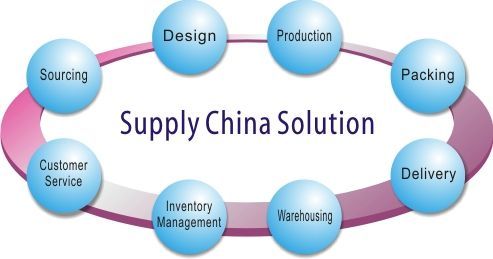
In today's fast-paced and highly competitive business world, supply chain management plays a crucial role in the success of any organization. An efficient supply chain ensures that products or services are delivered to customers promptly, at the right cost, and in the best condition. However, managing a supply chain can be complex and challenging, especially when dealing with multiple stakeholders, diverse locations, and changing market demands. To overcome these challenges, businesses turn to efficient supply chain management solutions. In this article, we will explore some of the key solutions that can help streamline and optimize supply chain operations.
1. Automation
Automation is a powerful tool that can significantly improve the efficiency of supply chain management. By automating repetitive and time-consuming tasks, such as order processing, inventory management, and tracking, businesses can save time, reduce human error, and free up resources for more value-added activities. With the help of modern technologies, including robotic process automation (RPA) and machine learning, businesses can automate various supply chain processes and gain real-time visibility into their operations. HTML markup example: <h2>1. Automation</h2>
2. Advanced Analytics
Advanced analytics refers to the use of sophisticated data analysis techniques, such as predictive modeling, data mining, and statistical analysis, to extract valuable insights from large volumes of supply chain data. By leveraging advanced analytics tools and technologies, businesses can gain a deeper understanding of their supply chain performance, identify potential bottlenecks or risks, and make data-driven decisions to optimize their operations. For example, predictive analytics can help forecast demand and optimize inventory levels, while prescriptive analytics can recommend the most efficient transportation routes. HTML markup example: <h2>2. Advanced Analytics</h2>
3. Collaboration and Visibility
Collaboration and visibility are essential elements of effective supply chain management. By collaborating closely with suppliers, distributors, and other partners, businesses can build strong relationships, improve communication, and align their goals and strategies. With the use of collaborative platforms and technologies, such as cloud-based supply chain management systems, businesses can share real-time information, track shipments, and resolve issues quickly. Enhanced visibility into the supply chain allows businesses to proactively respond to disruptions, optimize inventory levels, and improve overall customer satisfaction. HTML markup example: <h2>3. Collaboration and Visibility</h2>
4. Inventory Optimization
Inventory management is a critical aspect of supply chain management, as it directly impacts customer satisfaction, operational costs, and cash flow. Efficient supply chain management solutions include advanced inventory optimization techniques, such as just-in-time (JIT) inventory management and demand-driven replenishment. By analyzing historical data, market trends, and demand patterns, businesses can optimize inventory levels, reduce stockouts, and minimize excess inventory. This not only improves customer service but also helps businesses save costs by freeing up working capital tied up in inventory. HTML markup example: <h2>4. Inventory Optimization</h2>
5. Supply Chain Digitization
Digitization is revolutionizing the way supply chains operate. By embracing digital technologies, such as the Internet of Things (IoT), artificial intelligence (AI), and blockchain, businesses can achieve end-to-end visibility and control over their supply chain processes. For example, IoT sensors can provide real-time information about product conditions, enabling proactive maintenance and quality control. AI-powered algorithms can automate demand forecasting and routing optimization. Blockchain technology can enhance supply chain transparency, traceability, and trust among stakeholders, reducing the risk of counterfeit or fraudulent products. HTML markup example: <h2>5. Supply Chain Digitization</h2>
Conclusion
In conclusion, efficient supply chain management solutions are crucial for businesses to stay competitive in today's dynamic market environment. By leveraging automation, advanced analytics, collaboration and visibility, inventory optimization, and supply chain digitization, organizations can streamline their supply chain operations, improve customer satisfaction, and achieve cost savings. Implementing these solutions requires careful planning, investment in technology, and continuous monitoring of performance. However, the long-term benefits outweigh the initial challenges, as businesses gain a competitive edge and establish a resilient and efficient supply chain. HTML markup example: <h2>Conclusion</h2>
